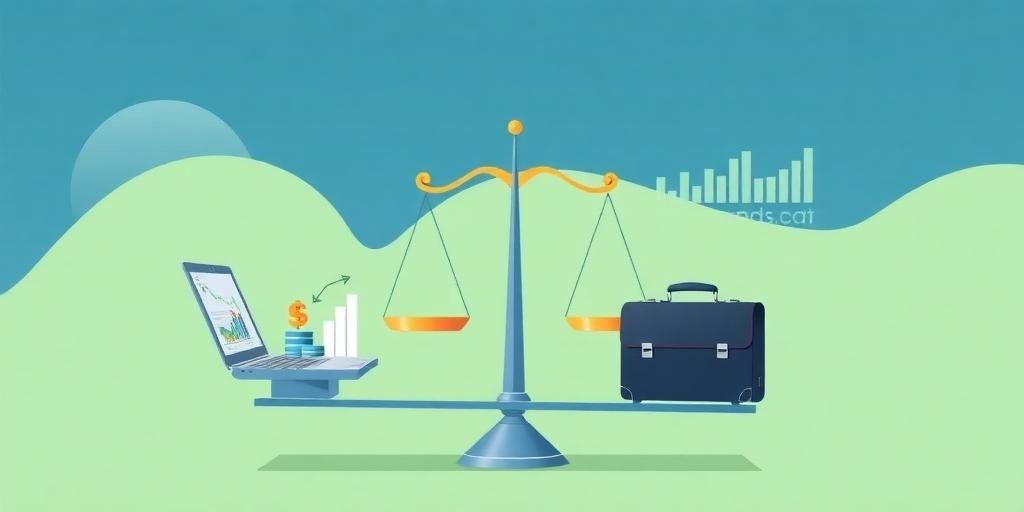Understanding the nuances between debt funds and equity funds is crucial for making informed investment decisions. Both offer unique risk-reward profiles and cater to different financial goals. This guide provides a comprehensive overview of debt funds and equity funds, highlighting their key differences, benefits, and drawbacks to help you determine which aligns best with your investment strategy.
What are Debt Funds?
Debt funds primarily invest in fixed-income securities such as government bonds, corporate bonds, and money market instruments. These funds generate income through the interest payments received from these securities. Debt funds are generally considered less volatile than equity funds, making them a suitable option for investors seeking stable returns with lower risk.
Key Characteristics of Debt Funds:
- Lower Risk: Debt funds carry lower risk compared to equity funds due to the stable nature of fixed-income securities.
- Stable Returns: These funds provide relatively stable returns, making them ideal for investors seeking consistent income.
- Interest Rate Sensitivity: Debt funds are sensitive to changes in interest rates. When interest rates rise, the value of debt funds may decline, and vice versa.
- Credit Risk: Debt funds are exposed to credit risk, which is the risk that the issuer of the debt security may default on its payments.
Benefits of Debt Funds:
- Income Generation: Debt funds provide a steady stream of income through interest payments.
- Capital Preservation: They help preserve capital due to their lower volatility.
- Diversification: Debt funds offer diversification benefits by investing in a variety of fixed-income securities.
What are Equity Funds?
Equity funds invest predominantly in stocks of publicly traded companies. These funds aim to generate capital appreciation over the long term. Equity funds are generally more volatile than debt funds but offer the potential for higher returns.
Key Characteristics of Equity Funds:
- Higher Risk: Equity funds carry higher risk due to the volatile nature of the stock market.
- Potential for High Returns: These funds offer the potential for significant capital appreciation.
- Market Sensitivity: Equity funds are highly sensitive to market conditions and economic factors.
- Diversification: Equity funds can provide diversification across various sectors and industries.
Benefits of Equity Funds:
- Capital Appreciation: Equity funds have the potential to generate substantial capital gains.
- Inflation Hedge: They can act as a hedge against inflation, as stock prices tend to rise with inflation over the long term.
- Growth Potential: Equity funds offer exposure to high-growth companies and sectors.
Debt Funds vs. Equity Funds: Key Differences
| Feature | Debt Funds | Equity Funds | | :----------------- | :----------------------------------------------- | :----------------------------------------------- | | Risk Level | Lower | Higher | | Return Potential | Lower | Higher | | Income | Stable income through interest payments | Potential for capital appreciation | | Volatility | Lower | Higher | | Investment Horizon | Short to medium term | Long term | | Taxation | Interest income is taxed at slab rates | Capital gains are taxed based on holding period |
Which Fund is Right for You?
The choice between debt funds and equity funds depends on your individual financial goals, risk tolerance, and investment horizon. If you are a conservative investor seeking stable income and capital preservation, debt funds may be a suitable option. On the other hand, if you have a higher risk appetite and are looking for long-term capital appreciation, equity funds may be more appropriate.
Factors to Consider:
- Risk Tolerance: Assess your comfort level with market volatility.
- Investment Goals: Define your financial objectives, such as retirement planning, wealth creation, or income generation.
- Investment Horizon: Determine the length of time you plan to invest.
- Financial Situation: Consider your current income, expenses, and existing investments.
Conclusion
Debt funds and equity funds serve different purposes in an investment portfolio. Understanding their distinct characteristics and aligning them with your financial goals is essential for successful investing. By carefully evaluating your risk tolerance, investment horizon, and financial objectives, you can make informed decisions that help you achieve your financial aspirations.









